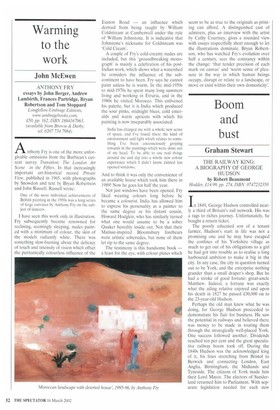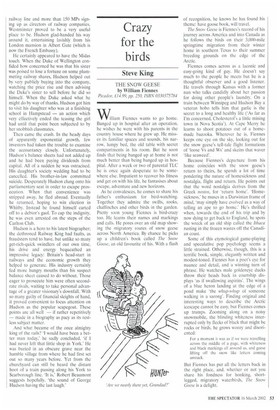Boom and bust
Graham Stewart
THE RAILWAY KING: A BIOGRAPHY OF GEORGE HUDSON by Robert Beaumont Hodder, £14.99, pp. 274, ISBN 0747232350 In 1849, George Hudson controlled nearly a third of Britain's rail network. His was a rags to riches journey. Unfortunately, he bought a return ticket.
The poorly educated son of a tenant farmer, Hudson's start in life was not a promising one and he may have escaped the confines of his Yorkshire village as much to get out of his obligations to a girl he had got into trouble as to realise a long harboured ambition to make it big in the city. In any case, the city in question turned out to be York, and the enterprise nothing grander than a small draper's shop. But he had a stroke of good fortune: great-uncle Matthew. Indeed, a fortune was exactly what the ailing relative enjoyed and upon his death in 1827 he passed /30,000 on to the 23-year-old Hudson.
Perhaps the old man knew what he was doing, for George Hudson proceeded to demonstrate his flair for business. He saw the potential in railways and believed there was money to be made in routing them through the strategically well-placed York. One success followed another, Dividends reached ten per cent and the great speculative railway boom took off. During the 1840s Hudson was the acknowledged king of it, his lines stretching from Bristol to Berwick and connecting London, East Anglia, Birmingham, the Midlands and Tyneside. The citizens of York made him their Lord Mayor. The electors of Sunderland returned him to Parliament. With separate legislation needed for each new railway line and more than 150 MPs signing up as directors of railway companies, Westminster proved to be a very useful place to be. Hudson glad-handed his way around it, entertaining lavishly from his London mansion in Albert Gate (which is now the French Embassy).
He certainly appeared to have the Midas touch, When the Duke of Wellington confided how concerned he was that his sister was poised to lose a fortune on some plummeting railway shares, Hudson helped out by very publicly buying into the company, watching the price rise and then advising the Duke's sister to sell before he did so himself. When the Duke asked what he might do by way of thanks, Hudson got him to visit his daughter who was at a finishing school in Hampstead — an action which very effectively ended the teasing the girl had until that point been subjected to by her snobbish classmates.
Then came the crash. In the heady days of apparently exponential growth, few investors had taken the trouble to examine the accountancy closely. Unfortunately, Hudson's balance sheets had not added up and he had been paying dividends from capital. All of a sudden he was ostracised. His daughter's society wedding had to be cancelled. His brother-in-law committed suicide. Desperately Hudson clung onto his parliamentary seat in order to escape prosecution. When that convenience was stripped away, he fled abroad. Eventually he returned, hoping to win election in Whitby. Instead he found himself carted off to a debtor's gaol. To cap the indignity, he was even arrested on the steps of the Carlton Club.
Hudson is a hero to his latest biographer; the dethroned Railway King had faults, as fraudsters tend to have, but unlike so many get-rich-quick swindlers of our own time, his drive and energy bequeathed an impressive legacy: Britain's head-start in railways and the economic growth they helped to generate. His industry certainly fed more hungry mouths than his suspect balance sheet caused to do without. Those eager to prosecute him were often secondrate rivals, waiting to take personal advantage of a greater visionary's downfall. With so many guilty of financial sleights of hand, it proved convenient to focus attention on Hudson as the popular scapegoat. These points are all well — if rather repetitively — made in a biography as pacy as its restless subject matter.
And what became of the once almighty king of the rails? would have been a better man today,' he sadly concluded, 'if I had never left that little shop in York.' He was buried in an obscure grave near the humble village from where he had first set out so many years before. Yet from the churchyard can still be heard the distant hoot of a train passing along his York to Scarborough line. 'It is,' Robert Beaumont suggests hopefully, 'the sound of George Hudson having the last laugh.'

















































































 Previous page
Previous page